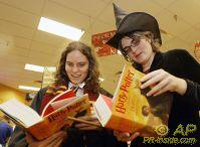Reading Harry Potter books as valuable as listening to Verdi opera
Harry Potter and the Deathly Hallows , the seventh and final volume of J.K. Rowling’s all-conquering fantasy series, sold a mountainous 8.3 million copies in its first 24 hours on sale in the United States. Pravda.ru has decided to ask British literature expert James Krasner to find out why this book enjoys such an immense popularity and how it could influence its readers.

Pravda.ru: There is nothing new or exclusive about Harry Potter's plot. There are a lot of fantasy books today that are very similar to Harry Potter's adventures. Why do you think it is Harry Potter who enjoys immense popularity among readers?
James Krasner: A lot of it is simply the quality of the writing. Rowling is exceptionally good at creating complicated plots and appealing characters. Nobody since Dickens, and maybe not even he, could interweave hundreds of characters and dozens of plotlines in the exciting, emotionally satisfying way Rowling does.
Also, the books appeal to both parents and children, who can read them together. The books have delightful magical events and exciting plots for children, but they also take a fairly sophisticated approach to family problems and morality. Look, for example, at Barty Crouch in book 4. He escapes Azkabahn by having his mother take his place using polyjuice potion. For kids, this is a surprising plot twist. Parents see in it also a terribly painful family saga, in which a mother sacrifices herself for her child who has already been condemned and rejected by his father, even though she knows that her son is a bad seed. Although these are very minor characters, adults can appreciate the profundity of the emotion involved, even as they enjoy the plot twist.
Rowling's books are particularly well suited to the multi-media tie-in economy because they include so much detail and trivia. The generation that grew up reading HP is also the generation that grew up chatting on the internet, and that sort of communication lends itself to fan culture.
Pravda.ru: Children around the world read books about Harry Potter's adventures. Can we speak here about some kind of Harry Potter addiction? If yes, then what are the negative sides of this addiction?
James Krasner: All fantasy liteature tends to create its own world, with its own language, animals, spells, food, locations, history, etc. All this encyclopedic information fuels fan culture -- we see this with Star Wars or, earlier, Star Trek. With HP, you really need to read the books over and over to remember all the specific types of candy at Honeydukes, or the detailed history of wizarding culture, or all the types of dragons, so it encourages the sort of fan culture in which people go online and exchange little pieces of information.
Also, because it's serial fiction, fans want to speculate about future books and reread past books to get clues. Because Rowling's plotting is so complex, there actually are clues to be found so it's exciting to search for them.
Fan culture has worked this way at least since the end of the 19th century, but the internet has allowed this sort of information exchange to explode. Like any on-line exchange, whether it's instant messaging or online gaming, fans can get preoccupied with it, but in this case I think the advantages outweigh the disadvantages.
Pravda.ru: What useful experiences can children obtain from Harry Potter books?
James Krasner: First, it's valuable the way watching a Shakespearean play or listening to a Verdi opera is valuable. Good art if always valuable because it teaches people about aesthetic beauty, proportion and organization, and because it offers insight into human nature. Children always tend to obsess over their particular hobby -- whether its baseball cards or bug collecting or dolls - and media technology has intensified this tendency.
Given that, I think it's good for them to obsess over something richly detailed, beautifully crafted, that promotes good moral values and makes them think. HP is a far healthier preoccupation than Star Wars, for example, or the sort of multi-volume mediocre kids literature like "The Babysitter's Club" or "Goosebumps."
Pravda.ru: A lot of children who have read the books about Harry Potter may have an impression that most problems in their lives can be solved with the help of magic. So many psychologists believe that such children may have serious problems in finding their place in real life. How could you comment on this?
James Krasner: The series starts with Harry losing his parents; this is his biggest problem, and magic can never solve it. Magic doesn't solve Harry's problems with romance or friendship or anger or loneliness. The books suggest that all fundamental human problems can't be solved by magic. The only character who really believes that magic is the most important thing is Voldemort.
Magic functions like politics in the book. Evil people use it for evil purposes, and good people try to fight them with it.
The books also clearly demonstrate that hard work, good friends, close family ties and good-heartedness will lead to success.
I don't really believe any child reads the books and thinks "I'll use magic to solve my problems." They probably wish it would, or fantasize that it would, just as they fantasize about getting a personal rocket ship and being 400 feet tall and being able to talk to animals. The same criticism could be leveled against any fantasy genre, and almost any childrens' book.
Prepared by Alexander Timoshik
Pravda.ru
Subscribe to Pravda.Ru Telegram channel, Facebook, RSS!





